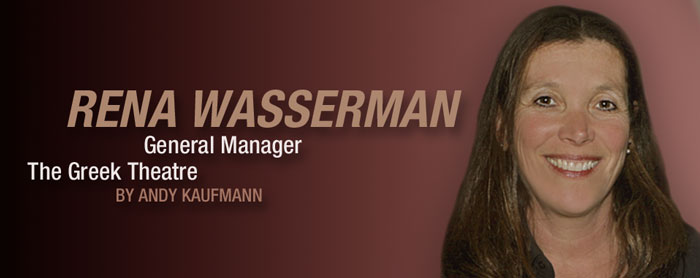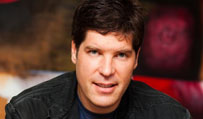Rena Wasserman
General Manager, The Greek Theatre
Years with Company: 9
Address: 2700 N. Vermont Ave.,
Los Angeles, CA 90027
Phone: 323-644-5018
Web: http://greektheatrela.com
E-mail: [email protected]
BACKGROUND: The historic Greek Theatre in Los Angeles has been entertaining audiences since 1929. A family-owned, outdoor venue, the Pollstar darling hosts 50 to 60 concerts a year. The venue’s general manager, Rena Wasserman, first learned the ropes in the S.F. area under fabled promoter Bill Graham.
Getting to The Greek
I started in this business in 1971 as a student at Berkeley High School. Luckily for us, Bill Graham, who brought concerts to the East Bay, booked the community theatre, which was part of the high school. So there was a group of us kids who were hired. We did a bit of everything, from pit security to lighting to being stagehands. I ended up working for Bill directly when I graduated from high school and worked at Winterland for a number of years. I found my way to UCLA for technical theatre, graduated and moved to New Hampshire, where I worked at Dartmouth College at their performing arts center for seven years. I found my way back to Los Angeles, working under Bill Graham opening The Wiltern Theatre and spent five years as a production manager, then became the general manager and stayed there for 20 years until I was wooed by Nederlander to manage The Greek. I’ve been here ever since.
To Every Season
Every day is different, primarily because we’re a seasonal venue. However, I work with Nederlander Concerts as the VP of Operations for all the third party buildings and many of the buildings that are ours. For example, we book The San Jose Civic, The Santa Barbara Bowl and The Grove in Anaheim. Some of those venues have shows year ‘round, while Santa Barbara and The Greek are seasonal. The day-to-day is very different in the off-season when the staff is minimal. We ramp up in March looking toward the mid-April/May opening.
Good Neighbor Policy
Dealing with the politics of a city-owned venue, as well as neighbors, is probably the most challenging aspect of my work. We’re very active in the community. We sit down with our neighbors regularly. I hold monthly coffee hours that are open to the public and give the forum in a relaxed setting for people to air their views on what it’s like to live nearby. I have found that the best relationships are those where you are simply truthful and transparent. As far as I can tell, the neighborhood really likes that.
There are certain things that happen in a venue of this size that’s outdoors and close to a neighborhood with one road in and limited parking that can never be perfect, which is really difficult for me as somebody who is a perfectionist. But the neighborhood is happy to know that we work with them in a cooperative spirit to try and make things better. We have a person whose sole job it is to be at their beck and call, so complaints are handled with an immediate response.
Keeping Calm and Carrying On
How I handle myself in those situations has to do with my upbringing and all of my experiences being alive, not necessarily specific training. People don’t like to be surprised. I think people would rather hear something they may not like the answer to than not having an answer. They don’t like thinking you’re hiding something. So while we can only do so much or go so far, the fact that we are working on it and communicating with them is helpful to the relationship and support we have in the neighborhood.
The Jewel of L.A.
The Greek is a jewel in a major urban city. It’s a natural setting that’s unparalleled. You get up here literally a mile from a major street, Los Feliz Boulevard, and it’s like you’re in another world. The intimacy is also amazing. You’d not know that this is a 6,000-seat venue. Every seat is relatively close to the stage and the sight lines are fantastic. Over the years, we’ve worked at perfecting the quality of the sound here and it is superb.
Remaining Independent
The biggest change [in the concert business] would be the SFX rollup in the late ‘90s. That was the company founded by Robert Sillerman that bought out all the independent promoters, or as many as he could. That changed the soul of the music industry, as far as promoters were concerned. It became large corporations running the concert business. One of the reasons I came to work for Nederlander Concerts was because it’s a mom-and-pop operation. And it’s still small enough to be nimble and not have to go through a bunch of red tape to affect change, be it the fan experience or something the artist may desire. That’s much more difficult with the bigger corporations that are now in our industry.
Ready, Willing and Able:
You have to be willing to do anything with a smile on your face. Some people are cut out for that and others aren’t. Being in this industry isn’t something you learn in school. There may be some who argue that; there are a handful of music business programs and colleges. But at the end of the day, most of it is common sense. I remember following Bill Graham around in the mid-‘70s and he was never without a pad of paper and pen to take notes. He was never afraid to pick up a piece of garbage. However successful he became, he did that. That was a huge lesson. To this day, I do that. I think the staff around me is surprised to see me jump in when there’s a problem. It’s not hiding out in an ivory tower; it’s being in the trenches with the people that make it happen.
Creating Experiences
We all talk about the fan experience, but Bill was into that long before it even was called that. He went out of his way to make sure the patron had a great experience. And he did the same thing back stage. To this day, other than Another Planet who worked with Bill as well, there’s no ambience backstage in our industry like when Bill was alive.
Tough Act
We take applications beginning in April. The main job opportunities are ushering floor staff and parking. Beyond that, if you’re going to work on our stage you’ve got to be a member of Local 33. If you work in our box office, you’ve got to be a member of the box office union. So the opportunities are not huge. But having said that, there’s roughly a hundred people that get hired every year. Many of them are long-term, loyal, returning staff members. Quite honestly, these jobs are hard to come by. I was general manager at The Wiltern for 20 years. Unless I left, there was nowhere for somebody underneath me to move up.
Top of the World
There’s nothing like looking at an audience and seeing the joy on people’s faces. And knowing I had some part in creating that environment is very rewarding. I feel incredibly lucky. I remember when I was about 17 and wanted to be a lighting designer and stage manager. I’d just begun working for Bill and my mother said, “How can you make a living doing that?” I was already being paid to be a stagehand. It wasn’t much money, but being paid was kind of over the top. You’re doing what you love and somebody’s actually paying you to do it. It doesn’t get any better. At 21, I’m driving across the country to pick up dancers at a dance company I stage managed and thought, oh my God, I’m being paid to drive across the country in a van with no spare tire. How great is this? I’m on top of the world.
It’s In the Details
A couple years ago, we presented Neil Diamond. That guy cared about every single person coming to the show. He asked me to take him up to the last seat in the terraces and he created a show for every single person. After the run, he wrote me a short note. My immediate reaction was, wow, I’ve never received such a nice note. I don’t meet every artist. It’s actually unusual when I do. I don’t think I’d ever actually gotten a written note from an artist. That he would recognize [the work we do] says so much about his attention to detail.













